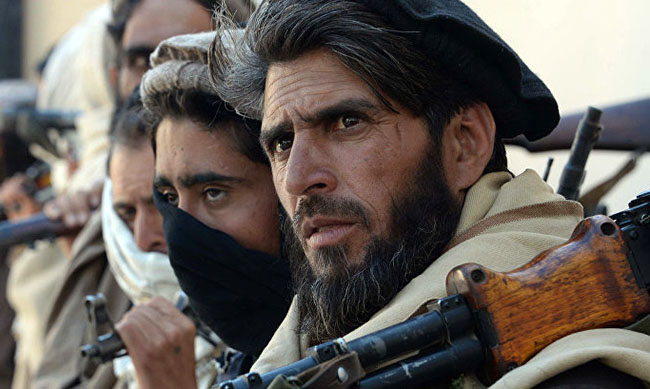The recent surge in militancy and series of terrorist attacks demonstrate the radical character of Mawlavi Haibatullah Akhundzada. Succeeding Akhtar Mansour – who was killed in US drone strike in Balochistan about four months back – Haibatullah intensified his offensives in Afghanistan and inflicted heavy casualties upon Afghan combatants and non-combatants alike. He, who has changed into reclusive leader the same as Mullah Omar, orchestrates bloody scenario behind the smoke screen and perhaps used as a pawn in political games.
Afghan nation bleeds incessantly as a result of the escalated militancy and bear the brunt of the terrorist attacks carried out by the Taliban fighters. Of late, the heart of Kabul City was shaken with suicide bombings which filled the air with a sense of fear and disappointment. This week, the terrorist attacks left at least 40 people dead and dozens wounded in Kabul.
The statistics from a comparative study of the US State Department’s country reports on terrorism for 2014 and 2015 show that the number of last year’s total attacks in Afghanistan increased by 127pc between February (88 attacks) and May (200). The US study also shows several significant global trends. The total number of terrorist attacks in 2015 decreased by 13pc around the globe and total deaths due to terrorist attacks decreased by 14pc, compared to 2014. “This was largely due to fewer attacks and deaths in Pakistan, Iraq and Nigeria. This represents the first decline in total terrorist attacks and deaths worldwide since 2012,” the State Department noted. In several countries, including Afghanistan, Bangladesh, Egypt, the Philippines, Syria and Turkey, terrorist attacks and total deaths increased in 2015. Although terrorist attacks took place in 92 countries in 2015, more than 55pc of all attacks took place in five countries: Iraq, Afghanistan, Pakistan, India and Nigeria. And 74pc of all deaths due to terrorist attacks took place in five countries: Iraq, Afghanistan, Nigeria, Syria and Pakistan.
The geographic reach of attacks by IS and its affiliates expanded as several existing terrorist groups pledged allegiance to IS. In addition to Boko Haram in West Africa, the most active of these IS branches were located in Afghanistan, Pakistan, Egypt, Libya and Yemen.
In 2015, a total of 11,774 terrorist attacks occurred worldwide, resulting in more than 28,300 total deaths and more than 35,300 people injured. In addition, more than 12,100 people were kidnapped or taken hostage.
With the appointment of Haibatullah as Akhtar’s successor, militancy has increased on a large scale in Afghanistan and civilian casualties make hackneyed headlines on national and international newspapers. In other words, Afghan nation, who dreamed of embracing democracy in a peaceful atmosphere in post-Taliban Afghanistan, has been changed into sacrificial lamb and the hemorrhage never stops. The insurgents have always been involved in indiscriminate killings and show no iota of mercy to civilians, including women and children.
After all, Haibatullah’s men have ushered in targeting educational centers and abducting instructors. The suicide attack on the American University of Afghanistan (AUAF) on August 24, 2016 – which reportedly led to the death of 13 individuals, seven of them students, and wounded many others – reveals this ugly fact. The attack came just two and a half weeks after two AUAF faculty members – one American and one Australian – were abducted by armed gunmen. Moreover, In January 2014, two AUAF employees, a student affairs specialist and a political science professor, were among 21 killed in a Taliban attack on a Kabul restaurant.
Needless to say, the Taliban’s ideology is in conflict with modern knowledge; however, they only banned the girls’ schooling and razed their schools to the ground, mainly during their regime. The Taliban’s radical leader extends the realm of his offensive and targets teachers and students and universities – this is the worst incident which creates fear and anxiety for instructors and as well as students.
The unmitigated militancy has resulted in mistrust between state and nation and harsh rhetoric is expressed in cyber space against the National Unity Government (NUG), mainly after suicide attacks and the words of condemnation stated by the NUG’s heads which can never alleviate the pain and anguish of the victims’ families. The level of dissatisfaction regarding the NUG is really high since the country is wrestling not only with insecurity but also economic, social and many other challenges and a large number of Afghan youths took refuge to foreign countries to get rid of such crises.
To gain the trust of the public, the government will have to tackle the issues and protect citizens’ rights and freedom. How long should Afghan nation suffer from insecurity without any effective strategies from the government?
Following this week’s attacks, The US on Tuesday assured the country of its “unwavering” support in the fight against terrorism. “The United States remains unwavering in our support for the people and government of Afghanistan,” US National Security Spokesperson Ned Price is cited as saying. He also condemned the attack “in the strongest terms”. The White House official said the United States would continue to work with the Afghan government to build a more secure, stable, and prosperous Afghanistan. The country, indeed, needs the support of foreign countries and international community and it is not to be left in the lurch.
Home » Opinion » The Continuation of Escalated Insurgency
The Continuation of Escalated Insurgency
| Hujjatullah Zia

